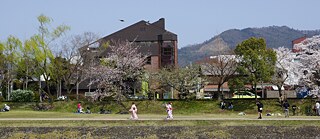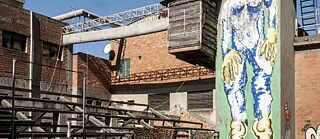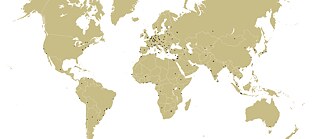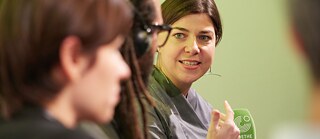Institut | Sprache. Kultur. Deutschland. (original) (raw)
Communicating with the world.
For diversity, understanding and trust.
 Show caption
Rym Hayouni © Arthur Tainturier Rym Hayouni © Arthur Tainturier
As part of the "Halaqat" project, Rym Hayouni developed with Oussema Gaidi the performance "Frame of Resonance", which was presented at the Jordanian IDEA Festival. As part of the "Halaqat" project, Rym Hayouni developed with Oussema Gaidi the performance "Frame of Resonance", which was presented at the Jordanian IDEA Festival.

branches of the Goethe-Institut are active in 98 countries around the world.

of the institutes are in Germany.

the first Goethe-Institut opened in Athens.

employees are at work worldwide.
Our focal points 2025
Transformation, Skilled Labour Migration and Democratic Values
The Goethe-Institut's priorities for 2025 were presented at the annual press conference. In this video, General Secretary Johannes Ebert talks about the topics that will significantly shape our work: Transformation, Skilled Labour Migration and Democratic Values.
 © Goethe-Institut
© Goethe-Institut
Goethe-Institut shapes the future
Despite the tight budget situation, the President and Executive Board of the Goethe-Institut have their sights firmly set on the future of the institution. These were the topics of the annual press conference. Soon also available in English.
 © Loredana La Rocca
© Loredana La Rocca
Pre-Integration and Transition Management
We support people who wish to migrate to Germany by preparing them for day-to-day living and the workplace. We offer a range of services to help them in their origin country before they depart and during the early days in Germany.
 © Bernhard Ludewig
© Bernhard Ludewig
Coming to Germany for qualification
18-year-old Alberto Gámez from Venezuela is at the start of his working life but already knows that he wants his career to take him to Germany. He told us what he likes about the working world in Germany and how the programme “Dual education mobility South America” (DAMOS) supported him on his journey to Germany.
 © Alberto Gámez
© Alberto Gámez
That's a class
More and more people in Sub-Saharan Africa want to learn German with African-European textbooks which are not full of cliches and are up to date from a methodology and didactic point of view. “Und jetzt WIR” makes that possible.
 © Hueber Verlag
 © Noriko Sawai/Goethe-Institut
© Noriko Sawai/Goethe-Institut
The freedom to be free
‘The freedom to be free’ is the title of an essay by Hannah Arendt in which she describes how the freedom to participate in politics is a central element of democracy. In 1967, she wrote that the topic was almost shamefully urgent. And this sentence still applies today.
 © Goethe-Institut
© Goethe-Institut
Ecological Futures
Ecological Futures deals with the ecological and social challenges posed by climate change and social developments. It brings together actors from urban practice, art and culture and neighborhood residents to tackle concrete problems and concrete opportunities in their neighborhoods.
 © Gian Andrea Montanino
© Gian Andrea Montanino
Network
The Goethe-Institut is represented by 151 institutes in 98 countries around the world. In 1952 the first Goethe-Institut opened in Athens.
Network

Career
Career
We will show you what we stand for as an employer and as a globally active cultural institute and what we offer you. Get to know us! We are the Goethe-Institut.
 © Goethe-Institut
© Goethe-Institut
- We inform you about projects and events happening at the branches of the Goethe-Institut around the world.
- Join our mailing lists and be the first to hear about our new events and services.